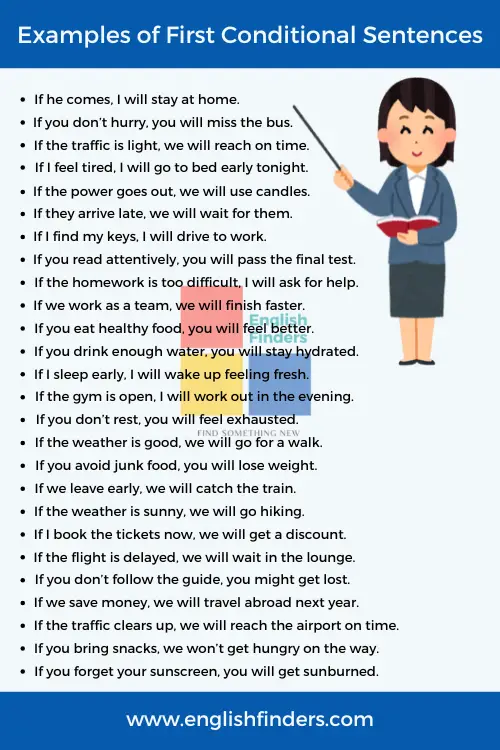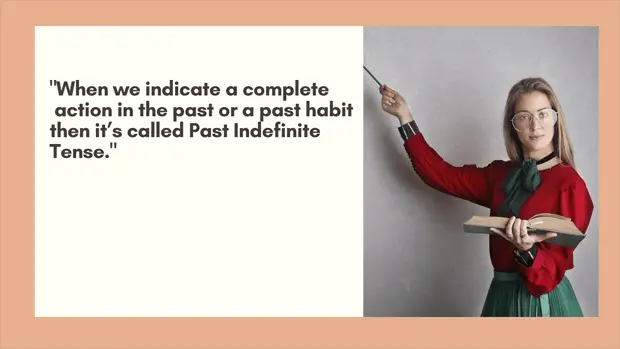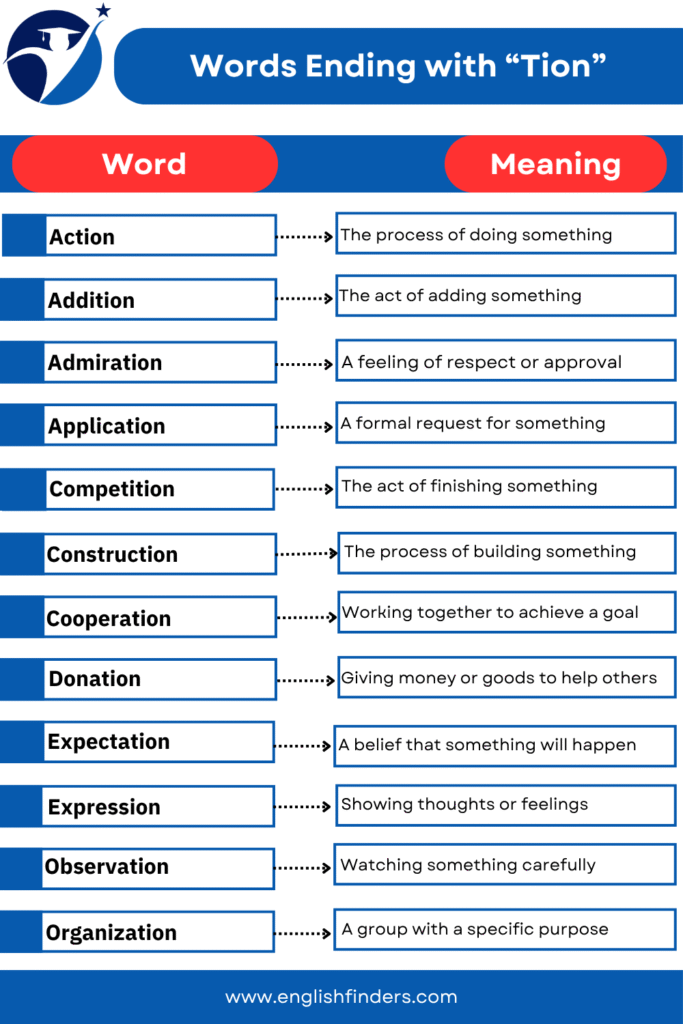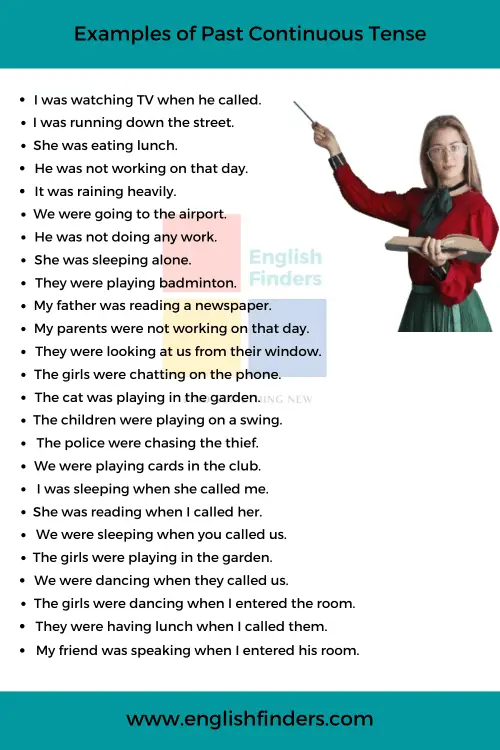Last updated on February 3rd, 2025 at 08:59 pm
Conditional sentences are essential parts of the English language. They help us to talk about possibilities, and plans and even give advice. Among the four types of conditional sentences, the first conditional sentence is the most useful because it describes real and possible situations in the future.
So, what is the first conditional? In short, it’s a way to express what will happen if a certain condition is met. The structure is simple:
👉 If + present simple, will + base verb
For example:
- If you walk every day, you will be fit for a longer time.
- If she makes a new recipe, I will definitely taste it.
See how the if-clause describes a condition and the main clause predicts the result.
You’ll find the first conditional useful when making plans, giving advice, or discussing future possibilities. In this lesson, we’ll explain when and how to use the first conditional and give you 50 examples to practice.
When to Use First Conditional Sentences
Quick Navigation
Let’s explore some common scenarios where we can use the first conditional sentences:
1. Making Predictions
We can use the first conditional to predict what might happen based on a specific condition. These predictions are logical and likely to occur. For Example:
- If the weather is nice tomorrow, we will go to the beach.
- If you don’t charge your phone, it will run out of battery.
2. Talking About Future Plans or Possibilities
The first conditional is perfect for discussing plans or possibilities that depend on something else happening. For Example:
- If I finish my homework early, I will watch a movie.
- If we save enough money, we will go on a vacation this summer.
3. Giving Warnings or Advice
We can use the first conditional to warn someone about the consequences of their actions or give them advice. For Example:
- If you touch the hot pan, you will burn yourself.
- If you study regularly, you will improve your grades.
4. Explaining Rules or Conditions
We can also use the first conditional to explain rules or what happens under specific conditions. For Example:
- If you don’t wear your uniform, you won’t be allowed into the school.
- If the light turns green, you can cross the street.
Structure of First Conditional Sentences
The first conditional is simple and easy to master once you understand its structure. Let’s break it down step by step!
Basic Structure
👉 If + present simple, will + base verb
- The if-clause describes a condition using the present simple tense.
- The main clause describes the result using will followed by the base form of the verb.
Here are some examples:
- If you study hard, you will pass the test.
- If it rains, we will stay together at home.
Parts of a First Conditional Sentence
- The if-clause (Condition):
- This part explains what needs to happen for the result to occur.
- Example: If you eat too much,
- The Main Clause (Result):
- This part explains what will happen if the condition is met.
- Example: you will feel sick.
Combined, it becomes:
- If you eat too much, you will feel sick.
Switching the Order
You can switch the order of the if-clause and the main clause without changing the meaning. Just remember to drop the comma when starting with the main clause.
- If you exercise regularly, you will stay healthy.
- You will stay healthy if you exercise regularly.
Both sentences mean the same thing!
Negative First Conditional Sentences
To express a negative condition or result, simply add not in either clause.
- If you don’t sleep well, you will feel tired tomorrow.
- You won’t enjoy the trip if it rains.
Questions in the First Conditional
You can also form questions using the first conditional.
- What will you do if you miss the bus?
- Will she join us if we invite her?
50 Examples of First Conditional Sentences
Here are 50 examples of first conditional sentences, grouped into categories to help you understand their use in different contexts.
1. Everyday Situations
- If he comes, I will stay at home.
- If the store is open, we will buy some groceries.
- If you don’t hurry, you will miss the bus.
- If the traffic is light, we will reach on time.
- If you clean your room, you will find your lost book.
- If I feel tired, I will go to bed early tonight.
- If the coffee is too hot, I will wait for it to cool down.
- If the power goes out, we will use candles.
- If they arrive late, we will wait for them.
- If I find my keys, I will drive to work.
2. School or Education-Related
- If you read attentively, you will pass the final test.
- If the teacher explains it again, I will understand better.
- If we complete the project on time, we will get good grades.
- If you attend the class regularly, you will improve your skills.
- If the homework is too difficult, I will ask for help.
- If we work as a team, we will finish faster.
- If I revise tonight, I will do well on the quiz tomorrow.
- If you don’t listen, you will miss important information.
- If we practice together, we will perform better in the competition.
- If the library is quiet, I will study there.
3. Health and Fitness
- If you eat healthy food, you will feel better.
- If we exercise daily, we will stay fit.
- If you drink enough water, you will stay hydrated.
- If I sleep early, I will wake up feeling fresh.
- If you don’t stretch before running, you might hurt yourself.
- If you follow the doctor’s advice, you will recover faster.
- If the gym is open, I will work out in the evening.
- If you don’t rest, you will feel exhausted.
- If the weather is good, we will go for a walk.
- If you avoid junk food, you will lose weight.
4. Travel and Adventure
- If we leave early, we will catch the train.
- If the weather is sunny, we will go hiking.
- If I book the tickets now, we will get a discount.
- If the map is correct, we will find the museum easily.
- If the flight is delayed, we will wait in the lounge.
- If we pack carefully, we won’t forget anything important.
- If you don’t follow the guide, you might get lost.
- If we save money, we will travel abroad next year.
- If the traffic clears up, we will reach the airport on time.
- If you bring snacks, we won’t get hungry on the way.
5. Warnings and Advice
- If you touch that wire, you will get an electric shock.
- If you don’t wear a helmet, you might get hurt.
- If you forget your sunscreen, you will get sunburned.
- If you don’t lock the door, someone might break in.
- You will lose your work if you don’t back up your files.
- If you don’t study now, you will regret it later.
- If you leave your phone here, it might get stolen.
- If you don’t follow the rules, you will face consequences.
- If you stay up too late, you will feel sleepy in the morning.
- If you speak politely, people will respect you.
Final Thoughts
The first conditional sentences help us to express real possibilities and outcomes, making our conversations more dynamic and relatable. Whether you’re planning your day, discussing options, or helping a friend, the first conditional will help you express your thoughts clearly and effectively.
First Conditional Sentences Quiz

Azizul Hakim is the founder & CEO of englishfinders.com. He is a passionate writer, English instructor, and content creator. He has completed his graduation and post-graduation in English language and literature.





